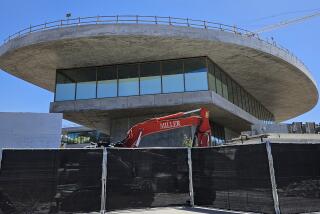Los Angeles County Museum of Art proposes merger with MOCA
The Los Angeles County Museum of Art proposed a merger with the financially struggling Museum of Contemporary Art on Tuesday.
The proposal provides a second bailout option for the downtown museum, which earlier received an offer of $30 million from billionaire philanthropist Eli Broad.
The merger plan sets up a face-off between L.A.’s most powerful arts patron and the museum with the largest art collection west of the Mississippi.
Under LACMA’s proposal, MOCA’s Geffen Contemporary space in Little Tokyo could become the primary venue for exhibitions and programs -- shifting the focus from MOCA’s signature, but smaller, Grand Avenue building. Artwork from MOCA’s world-renowned collection would also be displayed at LACMA’s Broad Contemporary Art Museum and the Lynda and Stewart Resnick Exhibition Pavilion, which is under construction on LACMA’s Wilshire Boulevard campus.
MOCA’s board of directors met Tuesday but said in a statement that no decision was reached. The board is set to reconvene Thursday.
“We’re giving them an alternative. It’s their decision,” said Michael Govan, the county museum’s director and chief executive officer. “In a tough spot, it’s always better to have alternatives.”
He said any decision would be made on MOCA’s timetable, not LACMA’s.
Broad, who funded the $56-million building for LACMA that bears his name, dashed the county museum’s hopes of acquiring his extensive private collection of contemporary art when he disclosed in January -- just before the gala opening of BCAM -- that he would instead keep his holdings in his own private foundation for loan to multiple museums. Broad recently disclosed plans to build yet another museum on the Westside for his collection.
Once LACMA’s most powerful and influential trustee, Broad is now a life trustee of the county museum, but in that capacity is not a voting member and therefore was not among those who voted for the merger plan, Govan said Tuesday. Broad is also a non-voting life trustee of MOCA, where he was founding chairman.
The bailout offered by Broad calls for MOCA to match half of his $30-million pledge. Broad would designate $12.5 million to help replenish MOCA’s endowment, with the remainder to cover deficits and future exhibitions. The offer would compel the museum to raise large sums in a dismal economic climate.
Broad declined to be interviewed but said in a statement: “The Broad Foundation favors any solution to MOCA’s current financial situation that accomplishes five things: maintains MOCA’s independence, keeps MOCA headquartered on Grand Avenue, continues MOCA’s world-class exhibition program, preserves its collection for view by the broadest public, and provides financial assurances that would provide the institution with long-term financial health.”
Since 2000, MOCA has overspent its revenues by $1 million a year on average, burning through reserves to pay bills. The economic crisis turned the chronic problem into an emergency.
Govan said the proposed merger presents a viable option for stabilizing MOCA’s finances. LACMA’s $68.2-million budget for 2007-08 was more than triple MOCA’s expenses of about $20 million. The merger would not require any additional funding from LACMA’s landlord, Los Angeles County, which provides nearly a third of its budget.
In tough economic times, Govan said, merging the boards and resources of the two museums would allow MOCA to take advantage of LACMA’s strength in fundraising, the county museum’s extensive and still-expanding gallery space and the greater attendance that LACMA has enjoyed.
County Supervisor Zev Yaroslavsky said a merger would mean “considerable savings, not token savings” to MOCA’s operating budget. LACMA has not spelled out specifics about staff cuts or the makeup of a combined board.
As a cost-cutting move, the Geffen Contemporary will close from early January through mid-June.
“A key element of the proposal is to keep the Geffen open all the time,” Govan said. “We could work together . . . to think about how to utilize these spaces. Right now, the No. 1 spot is Grand Avenue, the No. 2 space is Geffen; we might reallocate space in a very different way.
“The Geffen space has this kind of beautiful, soulful presence that wants certain kinds of programs. . . . It actually functions better for some things, worse for others because it doesn’t have the same climate control and all those other things,” Govan said.
He thinks that showing MOCA’s art in LACMA exhibition spaces would allow the public to see more, not less, of MOCA’s collection at any given time. “Ours is a complement to theirs; theirs is the premier collection,” Govan said. LACMA’s contemporary art holdings are strongest in Southern California artists, while MOCA’s are more international in scope.
Not everyone is enthusiastic about the merger plan. City Council President Eric Garcetti painted LACMA’s overture as civic and cultural poaching and questioned whether MOCA could hold onto its identity.
“Mergers often sound good at the beginning, but later on the smaller party often gets swallowed up and forgotten,” Garcetti said. In light of major development plans for Grand Avenue as an arts corridor, he expressed fears that MOCA’s headquarters there might become “the stepchild” of the institution.
Garcetti warned that a merger might jeopardize MOCA’s two $1 leases with the city, one on the Geffen Contemporary, the other on the land beneath the MOCA-owned Grand Avenue museum.
Aiming to discourage the merger, Garcetti and Councilwoman Jan Perry, whose district includes MOCA’s downtown venues, introduced a council motion Tuesday asking the city Community Redevelopment Agency to give MOCA $2.8 million in rent money derived from the neighboring California Plaza development.
Although all the details have yet to be worked out, Govan said the hope is for the two museums to maintain separate memberships and identities. “The thing to understand is that we’re not swallowing up MOCA,” he said.
More to Read
The biggest entertainment stories
Get our big stories about Hollywood, film, television, music, arts, culture and more right in your inbox as soon as they publish.
You may occasionally receive promotional content from the Los Angeles Times.











